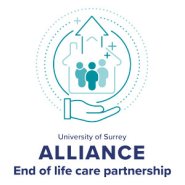
ALLIANCE: Enhancing the quality of living and dying with advancing frailty through integrated care partnerships: Building research capacity and capability
Start date
01 February 2022End date
30 April 2023Background
Frailty is a state of vulnerability that lowers physical and mental ability and leads to an increased risk of disability and admission to hospital or a care home. Frailty affects 10% of people aged over 65, increasing to around 65% of people aged over 90. Death from frailty is common.
Someone with advancing frailty may need help from others such as help around the home or going out, or they may be completely dependent on others for personal care. Living with advancing frailty often means having multiple care needs that require care from multiple providers and sectors for example the NHS, social services and the not-for-profit sector. However, this care is often patchy and not joined up, meaning families often need to provide and coordinate care. These factors can lead to poor quality of life for people with frailty and their families.
Little research has studied how to best support and care for people with advancing frailty as they near the end of life, particularly as they move between care providers and sectors.
Our new partnership will support care providers and individuals to:
- Grow research skills;
- Establish what we need to know to provide joined-up health and social care;
- Write clear research proposals;
- Be ready to lead or help with these studies.
Our partnership
Our partnership brings together three diverse regions of England that, according to NIHR statistics, are underrepresented in end of life research: South East England, South West London and the East Midlands. Partnership members are care-providing organisations across the NHS, social care and the not-for-profit sector, universities, and frail older people and their families. We will be supported by Integrated Care Systems, which are new government bodies designed to improve the way local care organisations work together. Our partnership is community-focussed as this is where most older people wish to live out their final years.
Activity and outcomes
Over a 15-month period, we will work with partnership members to grow research skills and knowledge and agree what research needs to be done, we will:
- Establish the partnership, including identifying and connecting all key contacts (months 1-2).
- Investigate and chart current research capability and current care provision to understand what helps and what hinders partnership care providers to work together to support those living with advancing frailty and get involved in research (months 3-9).
- Carry out activities such as developing and supporting patient and public involvement and engagement (PPIE) within each region, jointly developing guidelines, and delivering training to support partnership members to become more research confident (months 6-12).
- Agree future research priorities and prepare a research proposal for NIHR funding (months 12-15).
Involving people
Older people and their networks are central to every activity. A key outcome is that each region will be helped to develop local patient and public involvement and engagement (PPIE) systems to support the partnership and future research. PPIE development will follow NIHR PPIE principles and be led by an expert in the field.
Resources
This partnership co-designed multiple resources that focus on how to build evidence in clinical practice, and how to engage with meaningful patient and public involvement and engagement. These can be accessed using the links below. The final link takes you to a number of useful frailty resources. If you would like to know more about the partnership and our findings, you can read our paper or download it from the link below.
Useful evidence-building resources
- Evidence building and research in practice: increasing knowledge and engagement PowerPoint presentation (PDF)
- Suport available from the RDS PowerPoint presentation (PDF)
- Thinking outside the box...(PDF)
Useful PPIE resources
- A guide to why it's important to include the voices of older people living with frailty in research and service improvement projects, the challenges you might face, and top tips for engaging older people living with frailty.
- The ARC KSS ‘A selection of systematic reviews for Researchers, Services and Commissioners’ - See pages 11-12 for reviews relating to frailty/severe illness/end of life. Ludwig et al (2021) of particular interest if looking at the ethical aspects of involving older people. Covers the four principles: Autonomy, non-maleficence, beneficence, justice.
- The ARC South London collection of resources. ‘A collection of resources to support public involvement in research for researchers, non-researchers and public contributors (PDF)’. Resources are groups under the headings ‘Involvement in research’, ‘Equity diversity and inclusion in research’, ‘Evaluating research’, ‘Research ethics’, ‘Implementing research into practice’. It also indicates if the resource is guidance, event, book/e-book, podcast, training, webpage or toolkit.
- The ARC KSS PCIE Guide. Contents include why and when to do PCIE, how to do PCIE including recruitment, EDI, facilitating meetings, ethics, feedback, impact. Examples and case studies are also included.
- The ARC KSS PCIE Resources page. All PCIE resources gathered in one place. There is helpful information on how to get started with PCIE and a jargon buster.
- The ARC KSS co-production resources and information. There is a helpful leaflet for prospective PCIE called ‘Co-Production: Together we are better - a leaflet for the public.’ There is also ‘Co-production case studies: A retrospective review of case studies carried out within the ARC KSS’ which has case studies of previous projects involving co-production and may be helpful when setting up and thinking about how to include patients and public.
- PPIE contact details (PDF)
- Engaging older people with advancing frailty with evidence building: Learning, local links and top tips (PDF)
- How to RRS can help (PDF)
- ALLIANCE webinar (PDF)
Useful frailty resources
- Resource to support health and social care professionals and others provide high quality care for older people living with advancing frailty
- NHS England frailty resources
- Identifying and assessing frailty
- Tools that can be used to explore and measure what matters to older people living with frailty
- A range of useful resources, including a set of downloadable infographics about living longer
- Report looking at the state of ageing in 2022
- Link to Hospice UK's Extending Frailty Care programme that includes lots of resources and key links
Dissemination
We will work with all partnership members to agree how and where best to tell people about our work and learning, e.g. research-informed practice events and public engagement activities.
Funding amount
£100,293.88
Funder
Team
Principal investigators

Professor Caroline Nicholson
Professor of Palliative Care and Ageing
Biography
Caroline is a Clinical Academic Nurse and her research forwards understanding and care for older people living with complex needs. She is particularly interested in the transitions that occurs in the last phase of life. Caroline qualified as a Registered Nurse at St Bartholomew’s Hospital London. She worked as a specialist Palliative Care Nurse before undertaking a combined BSc (Hons) in Community Nursing DN/HV Certs at King’s College London. She went on to an MSc in Medical Anthropology at Brunel University London before completing her PhD at City University, London in 2009. She is a FHEA from the Institute of Education and holds a diploma in psycho-dynamic approaches to old age from the Tavistock and Portman NHS Foundation Trust, London
Caroline is a HEE/NIHR Senior Clinical Academic Lecturer, working between the School of Health Sciences at Surrey University and St Christopher’s Hospice, London. She is passionate in her belief that everyone should have access to the best care and support in the final years of their life. She has a long-held interest in the experiences and palliative care needs of older people and their families and is co-lead in End of life Care for the British Geriatrics Society.
Caroline studies the experiences and care of older people living with complex needs across care settings, to develop interventions which equally value quality of life with quantity of years in old age. She has a long-held interest in the experience of older people living with frailty, and their capabilities as well as their current and future vulnerabilities. Her work also includes the development of care services and a workforce that can recognize, facilitate and enhance the processes and outcomes of high-quality palliative and supportive care. Caroline is committed to building the next generation of clinical academics and is an NIHR Nurse Training Advocate . Research expertise includes participatory action research, narrative research, mixed method research and complex intervention development.

Professor Rowan Harwood
Clinical Consultant, Faculty of Medicine & Health Sciences, University of Nottingham
See profileProject management

Dr Sarah Combes
Research Fellow

Dr Emily McKean
Research Associate
Core group

Dr Louise Bramley
Head of Nursing and Midwifery Research, Nottingham University Hospitals NHS Trust

Dr Nadia Brookes
ARC KSS Co-production theme lead/Senior Research Fellow, University of Kent

Professor Adam Gordon
Professor of the Care of Older People, University of Nottingham

Dr Diane Laverty
Macmillan Nurse Consultant: Palliative and End of Life Care, London Ambulance Service NHS Trust

Dr Julie MacInnes
Senior Research Fellow, Integrated Care, ICAP Programme Lead, University of Kent

Dr Shannon Milne
Research lead, Princess Alice Hospice

Professor Heather Richardson
Chief Executive Officer, St Christopher’s Hospice

Dr Joy Ross
Consultant in palliative medicine, St Christopher’s Hospice
Research groups and centres
Our research is supported by research groups and centres of excellence.
Research themes
Find out more about our research at Surrey: